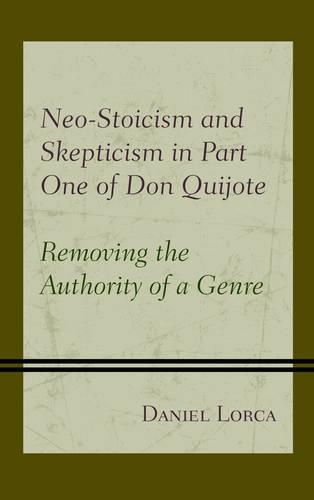
Neo-Stoicism and Skepticism in Part One of Don Quijote: Removing the Authority of a Genre
(Hardback)
Publishing Details
Neo-Stoicism and Skepticism in Part One of Don Quijote: Removing the Authority of a Genre
By (Author) Daniel Lorca
Bloomsbury Publishing PLC
Lexington Books
15th July 2016
United States
Classifications
Professional and Scholarly
Non Fiction
Literary studies: fiction, novelists and prose writers
863.3
Physical Properties
Hardback
168
Width 160mm, Height 235mm, Spine 19mm
422g
Description
This book explains how Cervantes took advantage of neo-stoicism and skepticism to remove the authority of the Romances of Chivalry, which was a popular genre during his time. It also explains why his strategy, which would have been instantly recognizable during the period, is no longer effective: our current moral systems are significantly different from the moral systems that were influential during Cervantes time, and consequently, what used to be self-evident is no longer the case. Therefore, this book may be useful to the literary critic interested in the philosophical foundations of Don Quijote, to the moral philosopher interested in the differences between pre-enlightenment virtue-ethics and current moral systems, and also in the field of the history of ideas. Don Quijote offers a unique opportunity to observe changes in moral thinking throughout time because it is a universal book, discussed extensively throughout out the centuries, and therefore the on-going discussion offers strong evidence to discover how morality has changed, and continues to change, through time.
Reviews
By encouraging readers to see the work through the lens of Cervantess contemporaries, Daniel Lorca adds an important wrinkle to scholarship about Quixote. Graduate students and researchers wishing to wrestle with the thorny issues posed by the novel will find the work of particular interest. The book is remarkably succinct, which is an advantage.... By encouraging us to read Don Quixote according to the mental framework of Cervantess contemporaries, Lorca adds another layer to our understanding of the ingenious gentleman from La Mancha. * Renaissance Quarterly *
Lorca sheds new light on the philosophical dimensions of Don Quijote by positing neo-stoicism and skepticism as integrated forces in the work. He demonstrates the impact of late Enlightenment readings on our current interpretation of the novel, as a corrective to excess focus on the legacy of Romanticism. His comparative analysis of the epistemological practices employed by Don Quijote and Marcela enhances our understanding of both characters and of Cervantes parody of romance narrative. -- Barbara Simerka, Queens College, CUNY
Daniel Lorca's analysis sheds fresh, revealing light on Cervantes and the early modern philosophical discourses that inform Don Quijote. He lays out his questions and develops his arguments with admirable clarity. This is a rigorous, erudite contribution to Cervantine studies. -- Christopher Weimer, Oklahoma State University
Author Bio
Daniel Lorca is assistant professor of modern languages and literatures at Oakland University.
